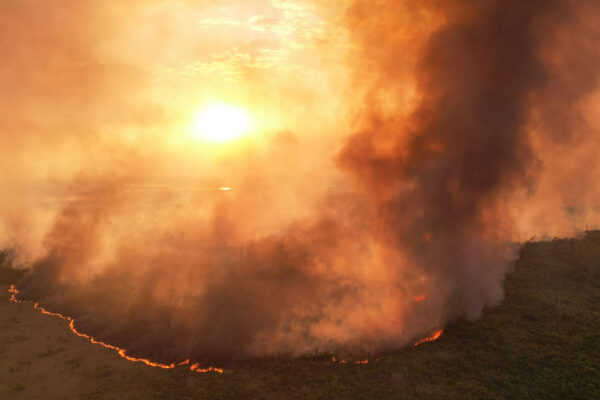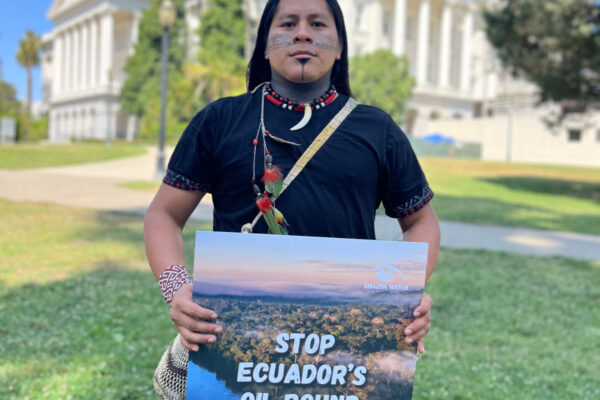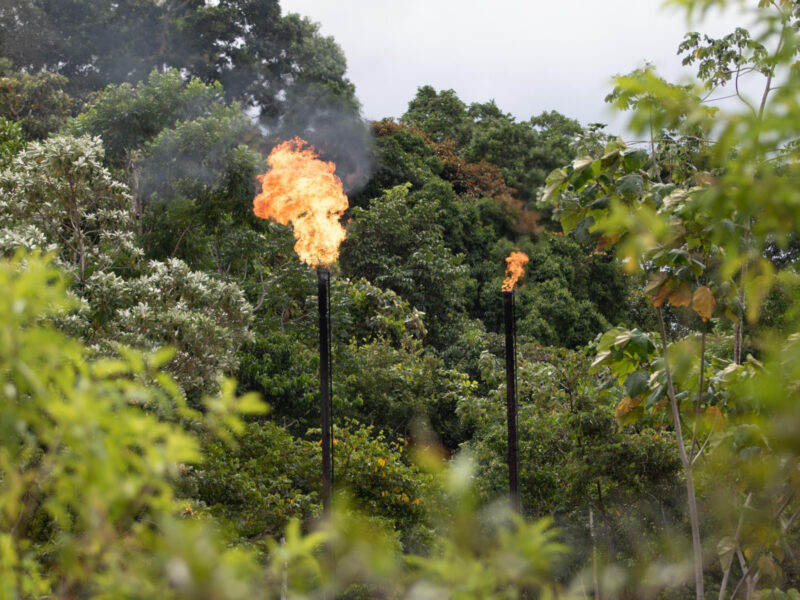Quito, Ecuador – Given the inaction of governments of the Amazon basin to meet the needs of Indigenous peoples in the face of the expansion of COVID-19, the Coordinator of Indigenous Organizations of the Amazon Basin (COICA) have launched today a campaign to raise at least three million dollars for emergency and essential funds for the next two weeks. However, the leadership of COICA warned that these funds are only an “absolute minimum to begin operation” and that many more funds will be needed to respond to the pandemic in the region.
COICA has called on governments, cooperation agencies, international organizations, foundations and citizens to donate to the Amazon Emergency Fund. This fund has been created with the aim of raising and channeling resources to Indigenous communities and grassroots organizations who face the COVID-19 emergency in the entire Amazon basin.
Indigenous leaders are seeking to raise more than three million dollars with the aim of starting operations to urgently provide food, medicine, emergency communication, evacuation, protection, and security against impending intrusions. The fund, which will later expand its goal in its search for resources to a second phase, will also seek to strengthen the food sovereignty and community resilience of Indigenous peoples.
“If the governments of the region are not going to help, let the international community do so. It seems that protecting Indigenous peoples is not convenient among all this discourse on the sovereignty of the Amazon. Nation states always talk about the sovereign power of the territory, but such power goes hand in hand with responsibility of caring for their people,” said Jose Gregorio Diaz Mirabal, general coordinator of COICA and a member of the Wakuenai Kurripaco people (Venezuela).
According to the Amazon Cooperation Treaty Organization (ACTO)1, 34 million inhabitants live in the region, accounting for 11% of the population of the Amazon countries, with 420 different Indigenous and tribal peoples speaking 86 languages and 650 dialects. COICA estimates that more than 9 percent of the Amazon population (more than 3 million) is made up of Indigenous peoples, and that at least 60 of such peoples live in total isolation.
COICA warned that if urgent measures are not taken by the nine countries which occupy the Amazon, the world will ignite an ethnocide with consequences to be suffered by most of the world.
“The Amazon has 30% of the biodiversity and 70% of the oxygen on the planet, but its real importance lies in the interrelation that the native peoples have with the forest, which ensures the life of all. If the interrelation which has guaranteed a large part of ecological stability is not taken care of, the planet will suffer a collapse of climate, with a very difficult return,” warned Tabea Casique Coronado, education coordinator of COICA and leader of the Ashéninka people (Peru).
The call to support the defense of Indigenous peoples against COVID-19 started in the United States on Tuesday, May 5th, where an extraordinary edition of Giving Tuesday2 was held for charities working on the pandemic. “Much of the United States, especially the south, center, and northwest, benefits from agricultural and seasonal rains, which come from the Amazon. And the science has been clear: protecting Indigenous peoples is protecting the Amazon, so helping them right now is helping them in the medium and long term,” said Julio César López, president of OPIAC and a native of the Inga people (Colombia).3
100% of the resources collected will be allocated to Amazon Indigenous communities. Decisions on grants and governance of the Fund will be made under strict coordination and communication by a Governing Council which includes Indigenous leaders of COICA and its member organizations, and to a lesser extent representatives of participating NGOs, donors and advisors who have formed the Founding Circle of Solidarity. The Fund will also have a Circle of Advisors made up of organizations and individuals with a proven track record to guide and support effective grant management strategies.
For more than 500 years, Indigenous peoples of the Amazon and throughout the Americas have faced invasions and loss of their ancestral territories. They have suffered ethnic and socioeconomic discrimination, and a constant threat of physical and cultural extermination which resulted in eviction, disease, and genocide. But today, Indigenous peoples, especially those living in voluntary isolation and the elderly, who are the guardians of wisdom, are at grave risk from the emergence of the pandemic. Traditional forest communities, including riverine, quilombola, rubber-tappers, and other extractive populations, who have been defending the jungle with their lives are also threatened.
“COVID-19, which affects the whole world, has reached Indigenous territories putting our lives at risk. But it should be said that this virus joins other pre-existing threats, of which we are permanently living with in Indigenous communities. Such threats are the direct environmental contamination due to the indiscriminate exploitation of natural resources, which limits access to public health and education services, as well as the violence and discrimination which is threatening not only the permanence of our peoples, but our knowledge of the conservation of the planet,” said Francinara “Nara” Soares Baré, coordinator of the COIAB and a native of the Baré people (Brazil).
COICA warned that as the pathogen spreads rapidly through the Amazon basin, Indigenous peoples and traditional forest communities are being disproportionately vulnerable to disease due to persistent lack of access to equitable and adequate public services, including housing and medical care, stemming from centuries of colonization and racism.
“It is urgent to take action, it is urgent to attend to our needs. Everyone is called to join this initiative and ensure that care reaches the communities, whether it be health, food or medical supplies. Only in this way, flattening the curve of the pandemic in the region, can we do our part to flatten the curve of carbon dioxide emissions and the sixth extinction,” concluded Sirito-Yana Aloema, president of OIS and native of the Kariña (Kalina) Caraib (Suriname) people, who represent the Guiana organizations.
The Amazon Emergency Fund will be made up of a consortium of non-governmental organizations (NGOs) and local and international donors who will work closely with COICA and its 9 national organizations, as well as with its partners and allies throughout the Amazon and the world, to support the emergency response to the advance of COVID-19.
About COICA and Its Member Organizations
COICA (Coordinator of the Indigenous Organizations of the Amazon Basin) is an Indigenous organization of international convergence that guides its efforts towards the promotion, protection and security of Indigenous peoples and territories through the defense of their ways of life, principles and values. social, spiritual and cultural. Our pre-existence is framed in the defense of life and the Amazon to continue as seed on earth and conserve forests for a living planet that ensures the continuity of our present and future generations. COICA is made up of the following Indigenous federations in the basin:
AIDESEP (Peru): Interethnic Association for the Development of the Peruvian Jungle – it is a confederation formed 40 years ago and which brings together 109 federations and 9 regional organizations, representing more than 1,809 communities where more than 650,000 Indigenous people live, including 16 linguistic families .
APA (Guyana): Amerindian Peoples Association of Guyana – based in Georgetown, includes 5 chapters that include 70,000 Indigenous people in 10 departments and represent the following 9 Indigenous peoples: Lokono Arawak, Akawaio, Arecuna, Carinya (Carib), Makushi, Patamona, Wai Wai, Wapishana and Warrau.
CIDOB (Bolivia): Confederation of Indigenous Peoples of the East, Chaco and Amazon of Bolivia – founded by 4 Indigenous nations of eastern Bolivia (Guaraní-Izoceños, Chiquitano, Ayoreos and Guarayos) on October 3, 1982, based in Santa Cruz de the saw. Subsequently, the other Indigenous peoples were included to gather 34 nationalities and Indigenous peoples living in the East, Chaco, and Amazon, located in seven of the country’s nine departments: Santa Cruz, Beni, Pando, Tarija, Chuquisaca, Cochabamba, and La Paz.
COIAB (Brazil): Coordination of Indigenous Organizations in the Brazilian Amazon – gathers more than 75 member organizations from all the states of the Brazilian Amazon (Amazonas, Acre, Amapá, Maranhão, Mato Grosso, Pará, Rondônia, Roraima and Tocantins) that They represent 160 Indigenous nations with around 430,000 people and 114 references of peoples in voluntary isolation (corresponding to almost 60% of the Brazilian Indigenous population) spread over more than 110 million hectares of the Amazon territory.
CONFENIAE (Ecuador): Confederation of Indigenous Nationalities of the Ecuadorian Amazon – represents about 1,5000 communities from the following Indigenous nations: Kichwa, Shuar, Achuar, Waorani, Sapara, Andwa, Shiwiar, Cofan, Siona, Secoya and Quijos .
FOAG (French Guiana): Federation of Indigenous Organizations in Guyana – includes Indigenous peoples representing more than 20 Indigenous organizations.
OIS (Suriname): Organization of Indigenous People in Suriname – comprising 9 Indigenous peoples representing about 40,000 Indigenous people in 10 departments and 55 settlements, who participated in the creation of the recent Conservation Corridor of Southern Suriname with an extension of 7.2 million hectares, which represents 40% of the national territory.
OPIAC (Colombia): National Organization of Indigenous Peoples of the Amazon Colombian – represents 56 nations in 162 Indigenous reservations and inhabiting an area of more than 24 million hectares in Colombian territory.
ORPIA (Venezuela): Regional Organization of Indigenous Peoples of the Amazon – brings together 19 organizations representing 19 Indigenous peoples.
Notes
- ACTO data here
- About Giving Tuesday
- The effects of tropical deforestation on rain cycles (Climate and Land Use Alliance)













